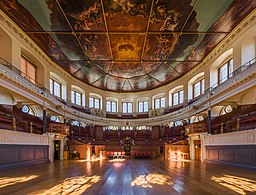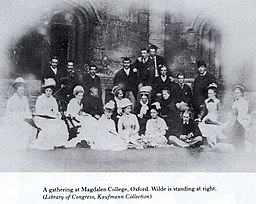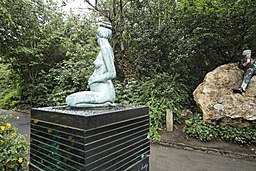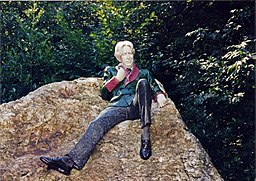A map marking some locations and factors important to Oscar Wilde and his publication of Ravenna during his time at Oxford. Do note that some locations, namely, Dublin and Oxford, have two pins that require zooming fairly close to the city in order to differenciate!
UWGB Capstone: Building Editions Dashboard
Description
UWGB Capstone Spring 2022.
Galleries, Timelines, and Maps
Facsimile gallery of Elbert Hubbard's Little Journeys: William Morris. Edited by Adriana Culverhouse and Mary Schreiner (University of Wisconsin, Green Bay). The copy derives from the personal collection of Mary Schreiner.
Individual Entries
 The resting place of the poet in Ravenna, Italy. He was only approximately 56 years old when he died, having spent almost two decades in exile from Florence (the last three years spent in Ravenna). Oscar Wilde, who considered Dante his literary idol, is likewise buried in Paris, rather than London, which he considered his home, or Dublin, where he was born. Officials of Florence regretted forcing one of their most famous citizens into exile after his death and requested Dante's remains to be transfered back from...
The resting place of the poet in Ravenna, Italy. He was only approximately 56 years old when he died, having spent almost two decades in exile from Florence (the last three years spent in Ravenna). Oscar Wilde, who considered Dante his literary idol, is likewise buried in Paris, rather than London, which he considered his home, or Dublin, where he was born. Officials of Florence regretted forcing one of their most famous citizens into exile after his death and requested Dante's remains to be transfered back from...
 While Oscar Wilde was born in Dublin to a staunchly Irish nationalist mother, he clearly considered London his home after his time at Oxford. After his two-year prison sentence and subsequent exile, Wilde chose to flee to Paris to live out his final days. Dublin, it seems, wasn't an option, and he only briefly visited his birthplace a handful of times during the height of his authorial success. A large part of this, of course, would have been the public Irish response to having...
While Oscar Wilde was born in Dublin to a staunchly Irish nationalist mother, he clearly considered London his home after his time at Oxford. After his two-year prison sentence and subsequent exile, Wilde chose to flee to Paris to live out his final days. Dublin, it seems, wasn't an option, and he only briefly visited his birthplace a handful of times during the height of his authorial success. A large part of this, of course, would have been the public Irish response to having...
 After winning the Newdigate Prize for Ravenna, Oscar Wilde was invited to perform at the Sheldonian Theatre, where his poem was printed and handed out to those who attended. In 1878, the Sheldonian was a lecture theatre, and the building is still in use as a play theatre. He dedicated his work to his American author friend, Julia Constance Fletcher's pen name, appending his poem: "To My Friend George Fleming, Author of 'The Nile Novel' and 'Mirage.'" His mother and brother were both...
After winning the Newdigate Prize for Ravenna, Oscar Wilde was invited to perform at the Sheldonian Theatre, where his poem was printed and handed out to those who attended. In 1878, the Sheldonian was a lecture theatre, and the building is still in use as a play theatre. He dedicated his work to his American author friend, Julia Constance Fletcher's pen name, appending his poem: "To My Friend George Fleming, Author of 'The Nile Novel' and 'Mirage.'" His mother and brother were both...

 Julia Constance Fletcher was born to an American Presbyterian minister from Indianapolis named James Cooley Fletcher. Missionary work led the Fletcher family to move around from Brazil to Naples and, in 1877, back to America. Julia C. Fletcher opted to stay in Rome and pursue a career in writing, where she would meet a twenty-two year old Oscar Wilde.
Julia Constance Fletcher was born to an American Presbyterian minister from Indianapolis named James Cooley Fletcher. Missionary work led the Fletcher family to move around from Brazil to Naples and, in 1877, back to America. Julia C. Fletcher opted to stay in Rome and pursue a career in writing, where she would meet a twenty-two year old Oscar Wilde.
Image credit: "...
more Transfering from Trinity College Dublin to Magdalen College at Oxford was arguably the event that "made" Oscar Wilde into the popularly depicted, well-dressed Aesthete. To say he flourished under the influence of his tutors and friends John Ruskin (a previous Newdigate winner in 1839) and Walter Pater, who was also J.C. Fletcher's "literary hero." From his freshman year and beyond, he allowed Oxford's influence to shape him into a dapper and aloof dandy with true and obvious literary skill.
Transfering from Trinity College Dublin to Magdalen College at Oxford was arguably the event that "made" Oscar Wilde into the popularly depicted, well-dressed Aesthete. To say he flourished under the influence of his tutors and friends John Ruskin (a previous Newdigate winner in 1839) and Walter Pater, who was also J.C. Fletcher's "literary hero." From his freshman year and beyond, he allowed Oxford's influence to shape him into a dapper and aloof dandy with true and obvious literary skill.

Photo credit: Bolo77, Attribution, via Wikimedia Commons.
 Capital city of the island of Lesbos, and birthplace of Sappho. Simeon Solomon's "Sappho and Erinna in a Garden at Mitylene" (1864) would have been of particular interest for a young Oscar Wilde. Solomon, born in London, was arrested in 1873 and 1874 for the 'crime' of being gay in Victorian England. His paintings focused on depictions of Jewish life and same-sex relationships. It is possible that Oscar Wilde's reference to Sappho in Mitylene in Ravenna came as a result of his tutor, Walter Pater's friendship with Solomon.
Capital city of the island of Lesbos, and birthplace of Sappho. Simeon Solomon's "Sappho and Erinna in a Garden at Mitylene" (1864) would have been of particular interest for a young Oscar Wilde. Solomon, born in London, was arrested in 1873 and 1874 for the 'crime' of being gay in Victorian England. His paintings focused on depictions of Jewish life and same-sex relationships. It is possible that Oscar Wilde's reference to Sappho in Mitylene in Ravenna came as a result of his tutor, Walter Pater's friendship with Solomon.

 In 1998, almost an entire century after Oscar Wilde's...
In 1998, almost an entire century after Oscar Wilde's...
